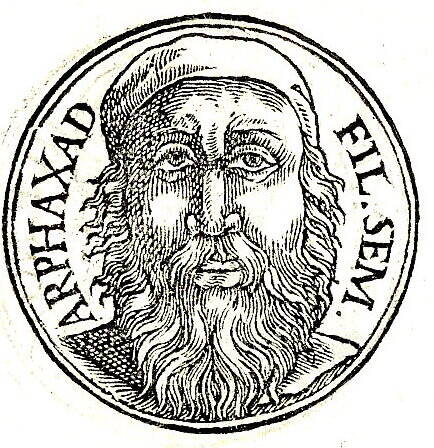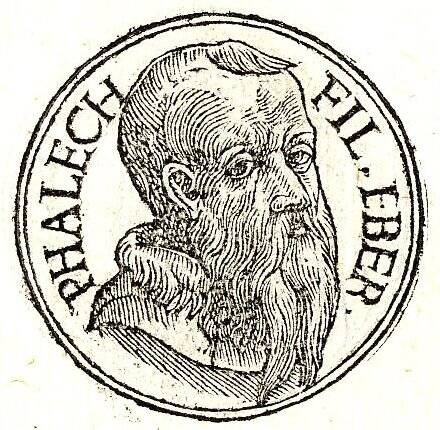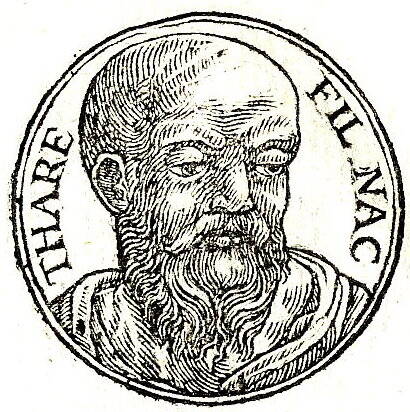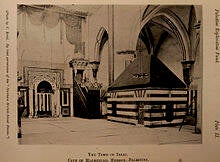Abraham, Isaac and Jacob

Noah
Noah was the son of Lamech.

Ham,
Ham was the second son of Noah
Children
ParentNoah
Ham's descendants are interpreted by Flavius Josephus and others as having populated Africa and adjoining parts of Asia. The Bible refers to Egypt as "the land of Ham" in Psalm 78:51; 105:23, 27; 106:22; 1 Chronicles 4:40.

Arpachshad
Arpachshad, Son of Shem
Born1656 AM
Ur, Sumer
(present-day Southern Iraq)
Died2094 AM (aged 438)
Children
Selah, and other sons and daughters
ParentShem
One of the sons of Shem (Gen 10:22-11:13; 1 Chron 1:17-24; Luke 3:36). He was the grandfather of Eber who is considered by some to be the eponymous ancestor of the Hebrews. The birth of Arpachshad is the first recorded birth after the Flood.
But was Arpachshad born on the Ark? Here is the theory.

Selah or Shelah.
Portrait from Promptuarii Iconum Insigniorum (1553)
Born1691 AM
Died 2124 AM (aged 433)
Children
Eber, and other sons and daughters
ParentArpachshad (or Cainan)

Eber
Eber imagined in the 1553 Promptuarium Iconum Insigniorum
Bornc. 2283 BCE (~4,305 years ago) Discrepancy
Ur, Sumer
(present-day southern Iraq)
Diedc. 1819 BCE (aged 464)
Ur, Sumer
Children
ParentSelah

Peleg
Peleg, son of Eber (as envisioned in AD 1553)
Born2249/2248 BCE (the time when the earth was divided)
Ur, Sumer
(present-day southern Iraq)
Died2010 BCE (aged 239)
Children
Reu and others
ParentEber

Serug
Serug from Guillaume Rouillé's Promptuarii Iconum Insigniorum
Born1820 AM (Masoretic chronology)
Died2050 AM (aged 230)
(Masoretic chronology)
SpouseMilcah
ChildrenNahor, and other sons and daughters
Parent(s)Reu and Ora

Nahor
Nahor, from "Promptuarii Iconum Insigniorum"
ChildrenTerah, and other sons and daughters
ParentSerug

Terah
Illustration of Terah in Latin from "Promptuarii Iconum Insigniorum"
BornUr Kaśdim, Chaldea, Sumer
(present-day southern Iraq)DiedHaran
(present-day southeastern Turkey)Children
Parent(s)Nahor ben Serug (father)
'Ijaska bat Nestag (mother, according to Book of Jubilees)[1]

Abraham, Isaac and Jacob are the patriachs.
Abraham was born in Harran which is in southeastern Turkey
Abraham is the common Hebrew patriarch of the Abrahamic religions, including Judaism, Christianity, and Islam. Wikipedia
- Spouse: Abraham in Islam, Abraham in Islam, Keturah
- Children: Ishmael, Isaac, Midian, son of Abraham, Zimran, Jokshan, Medan, son of Abraham, Ishbak, Shuah, Oldest to youngest:
- Parents: Terah, Amathlai, according to Talmud
- Founded: Judaism
- Abraham Casting out Hagar and Ishmael (1657)
by Giovanni Francesco BarbieriTitleAbrahamPersonal - BornUr Kaśdim in 1960BC. <--- to Abrahsm's timeline
(present-day Basra, Iraq)DiedHebron, Canaan
(present-day West Bank)- SpouseSarah
Hagar (concubine from Egypt)
Keturah (also concubine) - Children
Oldest to youngest:
- Ishmael (son, with Hagar)
- Isaac (son, with Sarah)
- Zimran (son, with Keturah)
- Jokshan (son, with Keturah)
- Medan (son, with Keturah)
- Midian (son, with Keturah)
- Ishbak (son, with Keturah)
- Shuah (son, with Keturah)
- ]Relatives
- Haran (brother)
- Nahor (brother)
- Sarah (half-sister and wife)
- Jacob (grandson)
- Esau (grandson)
- Lot (nephew)
- Twelve Tribes of Israel (great-grandsons)
- Dinah (great-granddaughter)

Lot
Biblical account
According to the Hebrew Bible, Lot was born to Haran, who died in Ur of the Chaldees. Terah, Lot's grandfather, took Abram (later called Abraham), Lot, and Sarai (later called Sarah) to go into Canaan. They settled at the site called Haran where Terah died.[3]
As a part of the covenant of the pieces, God told Abram to leave his country and his kindred. Abram's nephew Lot joined him on his journey and they went into the land of Canaan, settling in the hills of Bethel.[4]
Due to famine, Abram and Lot journeyed into Egypt, but Abram pretended that his wife Sarai was his sister. Hearing of her beauty, the Pharaoh took Sarai for his own, for which God afflicted him with great plagues. When the Pharaoh confronted Abram, Abram admitted that Sarai had been his wife all along, and so the Pharaoh forced them out of Egypt.[5]
The plain of Jordan
When Abram and Lot returned to the hills of Bethel with their many livestock, their respective herdsmen began to bicker. Abram suggested they part ways and let Lot decide where he would like to settle. Lot saw that the plains of the Jordan were well watered "like the gardens of the Lord, like the land of Egypt," and so settled among the cities of the plain, going as far as Sodom. Likewise, Abram went to dwell in Hebron, staying in the land of Canaan.[6]
The five kingdoms of the plain had become vassal states of an alliance of four eastern kingdoms under the leadership of Chedorlaomer, king of Elam. They served this king for twelve years, but "in the thirteenth year they rebelled." The following year Chedorlaomer's four armies returned and at the Battle of Siddim the kings of Sodom and Gomorrah fell in defeat. Chedorlaomer despoiled the cities and took captives as he departed, including Lot, who dwelt in Sodom.[7]
When Abram heard what had happened to Lot, he led a force of three hundred and eighteen of his trained men and caught up to the armies of the four kings in Dan. Abram divided his forces and pursued them to Hobah. Abram brought back Lot and all of his people and their belongings.[8]
Sodom
Later, after God had changed Abram's name to Abraham and Sarai's name to Sarah as part of the covenant of the pieces, God and two angels appeared to Abraham in the form of three men. God promised Abraham that Sarah would bear a son and he would become a great and mighty nation.[9] God then tells Abraham his plan,
"And the Lord said: 'Verily, the cry of Sodom and Gomorrah is great, and, verily, their sin is exceeding grievous. I will go down now, and see whether they have done altogether according to the cry of it, which is come unto Me; and if not, I will know."
As the angels continued to walk toward Sodom, Abraham pled to God on behalf of the people of Sodom, where Lot dwelt. God assured him that the city would not be destroyed if fifty righteous people were found there. He continued inquiring, reducing the minimum number for sparing the city to forty five, forty, thirty, twenty, and finally, ten.[10]
Lot's visitors
Further information: Sodom and Gomorrah
And the two angels came to Sodom in the evening; and Lot sat in the gate of Sodom; and Lot saw them, and rose up to meet them; and he fell down on his face to the earth; and he said: 'Behold now, my lords, turn aside, I pray you, into your servant's house, and tarry all night, and wash your feet, and ye shall rise up early, and go on your way.' And they said: 'Nay; but we will abide in the broad place all night.' And he urged them greatly; and they turned in unto him, and entered into his house; and he made them a feast, and did bake unleavened bread, and they did eat.
After supper, that night before bedtime, the men of the city, young and old, gathered around Lot's house demanding that he bring out his two guests that they might know them carnally. Lot went out, closing the door behind him, and begged them to refrain from so wicked a deed, offering them instead his virgin daughters to do with as they pleased. The men of Sodom accused Lot of acting as a judge and threatened to do worse to him than they would have done to the ‘men’.[11]
The angels drew Lot back in to his house and struck the mob with blindness. The angels then said that God had sent them to destroy the place, telling Lot, "whomsoever thou hast in the city; bring them out of the place". Lot went to the houses of his sons-in-law and warned them to leave the city, but they would not come, imagining that he spoke only in jest.[12]
Lot lingered in the morning so the angels forced him and his family out of the city, telling them to flee for the hills. Fearful that the hills would not afford them sufficient protection from the impending destruction, Lot instead asked the angels if he and his might hide in the safety of a neighbouring village. An angel agreed and the village was thenceforth known as Zoar. When God rained fire and brimstone upon Sodom and Gomorrah, Lot's wife looked back at the burning cities of the plain and was turned into a pillar of salt in recompense for her folly.[13]
The sun was risen upon the earth when Lot came unto Zoar. Then the LORD caused to rain upon Sodom and upon Gomorrah brimstone and fire from the LORD out of heaven; and He overthrow those cities, and all the Plain, and all the inhabitants of the cities, and that which grew upon the ground. But his wife looked back from behind him, and she became a pillar of salt. And Abraham got up early in the morning to the place where he had stood before the LORD. And he looked out toward Sodom and Gomorrah, and toward all the land of the Plain, and beheld, and, lo, the smoke of the land went up as the smoke of a furnace.
Instead of both fire and brimstone, Josephus has only lightning as the cause of the fire that destroyed Sodom: "God then cast a thunderbolt upon the city, and set it on fire, with its inhabitants; and laid waste the country with the like burning."[14] In The Jewish War, he likewise says that the city was "burnt by lightning".[15]
Daughters
Main article: Lot's daughters
After the destruction of Sodom and Gomorrah, Lot was afraid to stay in Zoar and so he and his two daughters resettled into the hills, living in a cave.[16] The elder daughter, seeing that there were no men to marry, told the younger that they should instead sleep with their father to continue their lineage. To this end, they plied Lot with wine until he was too drunk to know what he was doing. The elder then lay with her father without his knowing. She then insisted that her sister do the same - which she duly did on the following day. From these incestuous unions, the older daughter conceived Moab (Hebrew מוֹאָב, lit., "from the father" [meh-Av]), father of the Moabites;[17] while the younger conceived Ben-Ammi (Hebrew בֶּן-עַמִּי, lit., "Son of my people"), father of the Ammonites.[18]
The story, usually called Lot and his daughters, has been the subject of many paintings over the centuries, and became one of the subjects in the Power of Women group of subjects, warning men against the dangers of succumbing to the temptations of women, while also providing an opportunity for an erotic depiction. The scene generally shows Lot and his daughters eating and drinking in their mountain refuge. Often the background contains a small figure of Lot's wife, and in the distance, a burning city.[19]
Along with the accounts of Tamar and Judah (Genesis 38:11–26) and Ruth and Boaz (Ruth 3:7–8), this is one of three instances of "sperm stealing" in the Bible, in which a woman seduces a male relative under false pretenses in order to become pregnant. Each case involves a direct ancestor of King David.[20]

Abraham, Isaac and Jacob are the patriachs.
Abraham is the common Hebrew patriarch of the Abrahamic religions, including Judaism, Christianity, and Islam. Wikipedia
- Spouse: Abraham in Islam, Abraham in Islam, Keturah
- Children: Ishmael, Isaac, Midian, son of Abraham, Zimran, Jokshan, Medan, son of Abraham, Ishbak, Shuah, Oldest to youngest:
- Parents: Terah, Amathlai, according to Talmud
- Founded: Judaism

Cave of Machpelah,
Genesis 23 The Death and Burial of Sarah
1And Sarah was an hundred and seven and twenty years old: these were the years of the life of Sarah. 2And Sarah died in Kirjatharba; the same is Hebron in the land of Canaan: and Abraham came to mourn for Sarah, and to weep for her. 3And Abraham stood up from before his dead, and spake unto the sons of Heth, saying, 4I am a stranger and a sojourner with you: give me a possession of a buryingplace with you, that I may bury my dead out of my sight. 5And the children of Heth answered Abraham, saying unto him, 6Hear us, my lord: thou art a mighty prince among us: in the choice of our sepulchres bury thy dead; none of us shall withhold from thee his sepulchre, but that thou mayest bury thy dead. 7And Abraham stood up, and bowed himself to the people of the land, even to the children of Heth. 8And he communed with them, saying, If it be your mind that I should bury my dead out of my sight; hear me, and intreat for me to Ephron the son of Zohar, 9That he may give me the cave of Machpelah, which he hath, which is in the end of his field; for as much money as it is worth he shall give it me for a possession of a buryingplace amongst you. 10And Ephron dwelt among the children of Heth: and Ephron the Hittite answered Abraham in the audience of the children of Heth, even of all that went in at the gate of his city, saying, 11Nay, my lord, hear me: the field give I thee, and the cave that is therein, I give it thee; in the presence of the sons of my people give I it thee: bury thy dead. 12And Abraham bowed down himself before the people of the land. 13And he spake unto Ephron in the audience of the people of the land, saying, But if thou wilt give it, I pray thee, hear me: I will give thee money for the field; take it of me, and I will bury my dead there. 14And Ephron answered Abraham, saying unto him, 15My lord, hearken unto me: the land is worth four hundred shekels of silver; what is that betwixt me and thee? bury therefore thy dead. 16And Abraham hearkened unto Ephron; and Abraham weighed to Ephron the silver, which he had named in the audience of the sons of Heth, four hundred shekels of silver, current money with the merchant.
17And the field of Ephron, which was in Machpelah, which was before Mamre, the field, and the cave which was therein, and all the trees that were in the field, that were in all the borders round about, were made sure 18Unto Abraham for a possession in the presence of the children of Heth, before all that went in at the gate of his city. 19And after this, Abraham buried Sarah his wife in the cave of the field of Machpelah before Mamre: the same is Hebron in the land of Canaan. 20And the field, and the cave that is therein, were made sure unto Abraham for a possession of a buryingplace by the sons of Heth.
The Cave of Machpelah is a series of caves situated 30 kilometres (19 mi) south of Jerusalem in the heart of the Old City of Hebron in the West Bank. According to the Abrahamic religions, the cave and adjoining field were purchased by Abraham as a burial plot,

-
Jacob , his sons and their families were in Egypt for 400 years. Some scholars say 430 years, but reckoning from 400 years to the Exodus, that would put the time at 1886 BC. The pharaoh at that time is uncertain but could have been Sobekneferu a female ruler, but more likely was Amenemhet II, so I'll go with that. He ruled from 1897 BC to 1878 BC. Joseph was in Egypt when he was 17 years old and 30 years old he was made pharaoh' s vizier. The seven years of plenty began and Jacobs and his brothers came to Egypt sometime in that period of time. Jacob died in Egypt after he had been there 17 years.
- Genesis 47:28 And Jacob lived in the land of Egypt seventeen years, and the length of his life was 147 years. Jacob lived in Egypt seventeen years, and the years of his life were a hundred and forty-seven. Jacob lived for seventeen years after his arrival in Egypt, so he lived 147 years in all. And Jacob lived in the land of Egypt seventeen years.
- Doing the math. 1886 - 17 = 1839 Jacob died in 1839 BC. He was 147 years old when he died. So 1839 + 147 give us 1986 BC as the year Jacob (and Esau) were born. He and Esau were born when Isaac was 60 years old. therefore Isaac was born 1986 + 60 in 2046 BC. Abraham was 100 years old when Isaac was born which puts Abrahams birth at 2146 BC.
- Abraham was 175 yrs old when he died (Genesis 25:7). Abraham was 86 years old when Ishmael was born (Genesis ch.16) and 100 years old when Isaac was born (Genesis ch.21). His birth year was 2146 BC. His father was Terah
- Terah was 205 yrs old when he died (Genesis 25:7). Terah was 70years old when Abram was born (Genesis ch.16) His birth year was 2216 BC
- His father was Nahor
- Nahor was 148 yrs old when he died (Genesis 25:7). Nahor was 29 years old when Terah was born (Genesis ch.11) His birth year was 2245 BC His father was Serug
- Serug was 230 yrs old when he died (Genesis 25:7). Serug was 30 years old when Nahor was born (Genesis ch.16) His birth year was 2275 BC His father was Reu
- Reu was 239 yrs old when he died (Genesis 25:7). Reu was 30 years old when Serug was born (Genesis ch.16) His birth year was 2307 BC His father was Peleg
- Peleg was 239 yrs old when he died (Genesis 25:7). Peleg was 30 years old when Reu was born (Genesis ch.16) His birth year was 2337 BC His father was Eber
- Eber was 464 yrs old when he died (Genesis 25:7). Eber was 34 years old when Peleg was born (Genesis ch.16) His birth year was 2371 BC His father was Shelah.
- Shelah was 433 yrs old when he died (Genesis 25:7). Shelah was 30 years old when Eber was born (Genesis ch.16) His birth year was 2401 BC His father was Arpachshad
- Arpachshad was 438 yrs old when he died (Genesis 25:7). Arpachshad was 35 years old when Eber was born (Genesis ch.16) His birth year was 2146 BC His father was Shem
- Shem was 600 yrs old when he died (Genesis 25:7). Shem was100 years old when Arpachshad was born (Genesis ch.16) His birth year was 2536 BC His father was Noah
- Noah was 175 yrs old when he died (Genesis 25:7). Noah was 500 years old when Shem was born (Genesis ch.16) Hie was born in 3036 BC His other sons were Ham and Japheth
- .



Create Your Own Website With Webador